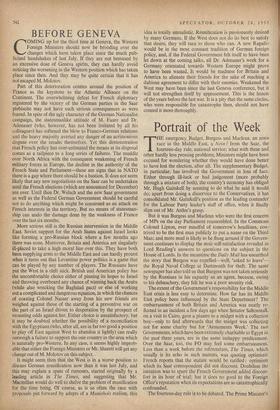BEFORE GENEVA
COMING up for the third time at Geneva, the Western , Foreign Ministers should now be brooding over the L.., changes which have taken place since the much pub- licised handshakes of last July. If they are not bemused by an excessive dose of Geneva spirits, they can hardly avoid noticing the worsening in the Western position which has taken place since then. And they may be quite certain that it has n )t escaped M. Molotov.
Part of this deterioration centres around the position of France as the keystone to the Atlantic Alliance on the C pntinent. The overwhelming defeat for French diplomacy registered by the victory of the German parties in the Saar plebiscite may not have such serious consequences as were feared. In spite of the ugly character of the German Nationalist campaign, the statesmanlike attitude of M. Faure and Dr. Adenauer (who, however, has not been imitated by all his colleagues) has softened the blow to Franco-German relations and the heavy majority averted any danger of an acrimonious dispute over the results themselves. Yet this demonstration that French policy has over-estimated the means at its disposal comes as a tailpiece to a long series of failures. The muddle over North Africa with the consequent weakening of French military forces in Europe, the decline in the authority of the French State and Parliament—these are signs that in NATO there is a gap where there should be a bastion. It does not seem likely that any new negotiations on the Saar can be undertaken until the French elections (which are announced for December) are over. Until then Dr. Welsch and the new Saar government as well as the Federal German Government should be careful not to do anything which might be construed as an attack on French interests in the territory. But no means of statesman- ship can undo the damage done by the weakness of France over the last six months.
More serious still is the Russian intervention in the Middle East. Soviet support for the Arab States against Israel looks like forming a pro-Russian block where a few months ago there was none. Moreover, Britain and America are singularly ill-placed to take a high moral line over this. They have both been supplying arms to the Middle East and can hardly protest when it turns out that Levantine power politics is a game that can be played by any number of players. The Russians have p it the West in a cleft stick. British and American policy has the uncomfortable choice either of pinning its hopes to Israel and throwing overboard any chance of winning back the Arabs (while also wrecking the Baghdad pact) or else of working out a complicated and dangerous equation, in which the chances of coaxing Colonel Nasser away from his new friends are weighed against those of the starting of a preventive war on the part of an Israel driven to desperation by the prospect of mounting odds against her. Either choice is unsatisfactory, but it may be doubted whether the possibility of a reconciliation with the Egyptians.(who, after all, are in far too good a position to play off East against West to abandon it lightly) can really outweigh a failure to support the one country in the area which is naturally pro-Western. In any case, it seems highly improb- able that either the Foreign Ministers or Mr. Sharett will get any change out of M. Molotov on this subject.
It might seem then that the West is in a worse position to discuss German reunification now than it was last July, and this may explain a spate of rumours, started originally by a leading article in The Times, and suggesting that Mr. Macmillan would do well to shelve the problem of reunification for the time being. Of course, as is so often the case with proposals put forward by adepts of a Munichois realism, this idea is totally unrealistic. Reunification is passionately desired by many Germans. If the West does not do its best to satisfy that desire, they will turn to those who can. A new Rapallo would be in the most constant tradition of German foreign policy, and, if the Federal Government felt itself to have been let down at the coming talks, all Dr. Adenauer's work for a Germany orientated towards Western Europe might prove to have been wasted. It would be madness for Britain and America to alienate their friends for the sake of reaching a dubious agreement to differ with their enemies. Weakened the West may have been since the last Geneva conference, but it will not strengthen itself by appeasement. This is the lesson of the years before the last war. It is a pity that the same circles. who were responsible for catastrophe then, should not have conned it more thoroughly.


































 Previous page
Previous page